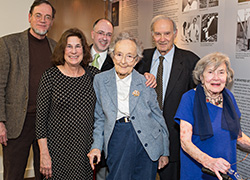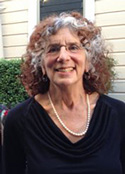

A Father's Enduring Legacy
A Father's Enduring Influence
Editor’s Note: This story is the second in a three-part series looking at the legacy left by Dr. Saul Korey, Einstein’s founding chair of neurology.
As a founding faculty member at Einstein, Dr. Saul R. Korey pioneered an interdisciplinary approach to the neurology department that he established. Today, more than 50 years after his death, that approach is still in practice. Though his life was cut short by pancreatic cancer at age 45, he was also a towering figure in the lives of his children, Cathie, Suzanne and Barry, who were 16, 14 and 11, respectively, when he died in 1963.

Remembering Dr. Korey: A special tribute, held in November 2013, honored the legacy Dr. Saul Korey left at Einstein. Those in attendance included daughter Cathie (second from left) and his widow Doris (at far right). Also pictured (from left) are Drs. Steven Walkley, Mark Mehler, Isabelle Rapin and Lewis Rowland.Despite his death so early in their lives, Dr. Korey influenced his children and the paths they followed.
“Dad would discuss his work at the dinner table and his colleagues were often guests in our home,” recalled Cathie. “Medicine became ingrained in me.”
Detours on the Road to Medical School

Dr. Korey with son, BarryWhile the path to a medical career was not direct for either of them, both Barry and Cathie attended Einstein. Barry graduated in 1982, preceding his sister by five years.
Cathie, now a hospitalist at Mercy Medical Center in Springfield, Massachusetts, studied anthropology at Bennington College, and then worked a dozen years as a community activist in Milwaukee and in New York before attending Einstein in her mid-30s. Following residency, she worked five years for the Indian Health Service in Chinle, Arizona, living with her two children on the Navajo Nation reservation, before coming east.
For Barry, writing and travelling filled the time between graduating from Sarah Lawrence University in 1974 and enrolling at Einstein in 1978. Although he initially considered neurology, his keen interest in psychiatry led to a career in that discipline. He practiced in Westchester County and was in charge of the borderline inpatient unit at New York Medical College until his own early death at the age of 56, in 2008.
“Barry died of an ocular melanoma,” said Suzanne. “Although their cancers were different, I’ve always thought there was some kind of connection.”
The Power of Books and History

Cathie Korey, early in her careerWhile Suzanne was never moved to pursue medicine, her father’s influence also affected her career choice—albeit more subtly. It was his extensive library—which included many books about history—that held the greatest sway.
“Books were such a big part of our lives,” she said. ”I remember when Dad returned home from his first chemotherapy session. He went to his study to be among his books.”
Suzanne majored in history at the University of Wisconsin. And, when she found her calling, books played a key role. “I did community printing and book publishing.”
Suzanne worked as a press operator for 25 years, and then co-owned a print shop for 5 years. She then transitioned to teaching graphic communications at City College of San Francisco, eventually becoming the department head. After holding that position for nine years, she moved into administration.
“Although our fields were different, I was thrilled to have the same type of position as my father and to apply an interdisciplinary approach to our work,” she said.
A Devastating Loss
”Our father’s death was like a bomb that dropped on the family,” recalled Suzanne. “Mom got a full-time job as a social worker to support us and we moved to Manhattan.” Prior to Dr. Korey’s death, the family had lived in Hartsdale.
“Barry was so young when Dad died. I often think he was more influenced by Dad’s death than by his life,” she added.
“Losing Dad was crushing for him,” agreed Cathie. “He was the only boy, and it left him very lonely.”
Their Father’s Daughters

Suzanne KoreyIn viewing the tribute that Einstein paid to their father in November 2013 to mark the 50th anniversary of his death, both sisters noted that they had not realized the extent of his influence. “He didn’t talk about his work in that way,” said Suzanne. “We just knew that he worked hard and loved what he did.”
“He was passionate about medicine and science,” agreed Cathie. “And he followed his passions until the very end.”
Like Dr. Korey, the sisters follow their passions. For Suzanne, that remains books. “I’m thinking about creating a bookmobile in my car this summer,” she said. She retired last June and has taken up the piano again. (As a child, she studied at Julliard.) She also works at a soup kitchen she’s been involved with for many years.
As for Cathie, the physician, taking care of her patients remains a full-time job. “I love what I do and plan to keep doing it for quite a while,” she said. She currently alternates between 80-hour work weeks and taking care of Mrs. Korey in New York City.
“It’s hard to believe Dad’s been gone 50 years,” she added. “He’s still very much a part of us.”
Posted on: Friday, May 9, 2014


